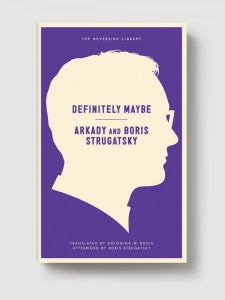In a radio broadcast in October 1939, Churchill said:
I cannot forecast to you the action of Russia. It is a riddle, wrapped in a mystery, inside an enigma; but perhaps there is a key. That key is Russian national interest.Definitely Maybe, by Arkady and Boris Strugatsky, is a riddle wrapped in a mystery inside an enigma.
I hesitate to call it science fiction, although that's the label commonly applied to the work of the Strugatsky brothers. It's deeply psychological, with several ambiguities and loose ends. It could also be read as a political satire or social commentary.
I was realizing that just yesterday I was man, a member of society. I had my own concerns and worries, yes, but as long as I obeyed the laws created by the system — and that had become a habit — as long as I obeyed those laws, I was protected from all imaginable dangers by the police, the army, the unions, public opinion, and my friends and family. Now, something in the world around me had gone haywire. Suddenly I became a catfish holed up in a crack, surrounded by monstrous vague shadows that didn't even need huge looming jaws — a slight movement of their fins would grind me into a powder, squash me, turn me into zilch. And it was made clear to me that as long a I hid in that crack I would not be touched. Yet it was even more terrifying than that. I was separated from humanity the way a lamb is cut off from the herd and dragged off somewhere for some unknown reason, while the herd, unsuspecting, goes on about its business, moving farther away into the distance. I would have felt much better if only they had been warlike aliens, some bloodthirsty, destructive aggressors from outer space, from the ocean depths, from the fourth dimension. I would have been one among many; there would have been a place for me, work for me; I would be in the ranks! But I was doomed to perish in front of everyone's eyes. No one would see a thing, and when I was destroyed, ground to dust, everyone would be surprised and then shrug it off.Does that sound more like the threat of an alien intelligence or of government?
Dmitri Alekseevich Malianov, astrophysicist, is on the brink of a great discovery.
In the yellow, slightly curved space, the axially symmetric cavities turned slowly like gigantic bubbles. Matter flowed around them, trying to seep through, but it couldn't. The compressed itself on the boundaries to such incredible densities that the bubbles began to glow.His wife and son have gone to Odessa, leaving him alone with the cat to work. But one interruption (a beautiful woman) follows another (a delivery of vodka and caviar), and soon a full cast is parading through the apartment: Arnold Pavlovich Snegovoi, highly mysterious neighbour, colonel, supposed by Malianov to be a physicist, in rocketry. Valentin Andreevich Weingarten, biologist and womanizer. Zakhar Gubar, master craftsman techie, patent holder of several inventions, lady-killer of the highest degree. Vladlen Semenovich Glukhov, orientalist.
And Philip Pavlovich Vecherovsky, state prize laureate.
Vecherovsky lapsed into muffled guffaws that passed for satisfied laughter. That's probably the sound H.G. Wells's Martians made when they drank human blood; Vecherovsky guffawed like that because he liked the poem he had just read. One would think that the pleasure he derived from poetry was purely physical.All these men are connected, their life's work has been waylaid, the universe is conspiring against them. I find it curious, and commendable, that while the supposed cosmic intelligence is unknowable, there is no hypothesizing about anything like God; for these are men of science (or at least, academic rigour), living under a godless Soviet regime.
When they are forced to consider that the orientalist is among their ranks, they realize that it is not merely scientific advances and technological innovation that are being stifled but rather the whole of knowledge of humankind.
Continued reference to Vecherovsky's Martian guffaws lends to the impression that there is something alien among them, even while Vecherovsky is firmest his conviction that he knows what's going on and how best to combat it.
The story is presented in the form of excerpts, all starting with ellipses, sometimes midsentence, but they are presented in order, with no obvious gaps between them. Excerpts of what?
There are so many unresolved situations in this book. It's impossible to state with any certainty which occurrences are purely coincidental or imagined or planned as a joke or part of a grand conspiracy, whether governmental or cosmic in nature.
Roadside Picnic by the Strugatsky brothers, which I read a couple years ago, conveys suspense and horror so palpably; I count it as one of my favourite books ever. Definitely Maybe takes place in a more familiar environment, yet is more mysterious — the enigma it is wrapped in is subtler. It is less about an obvious external threat than a creeping paranoia that's generated from within.
I finished reading Definitely Maybe a couple weeks ago, but I find myself thinking of it often. It is in fact more potent now than when I turned the final page. I continue to consider, with a shudder:
Work toward what end? What price my family, my peace of mind? At what cost knowledge?
See also Kaggsy's Bookish Ramblings.



No comments:
Post a Comment